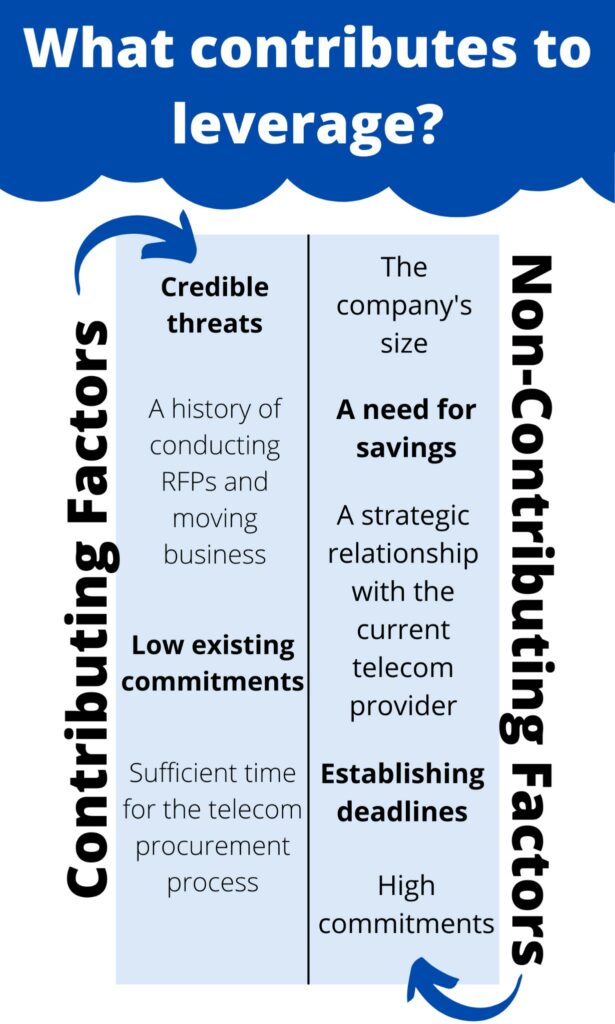Leverage is crucial for success in the telecom procurement process. Without leverage, you’re likely to make concession after concession and walk away with a contract that’s less than ideal. On the other hand, maintaining as much leverage as possible increases your chances of thriving throughout negotiations and gaining the contract terms you desire. Read this guide to discover the power of leverage in telecom procurement.
Continue reading to discover:
Want to maximize your leverage? Consider working with Technology Procurement Group! We have the knowledge, experience, and industry expertise to help you achieve the results you’re looking for in the telecom procurement process. Reach out anytime by calling us at 1-888-449-1580, emailing us at info@TPG-llc.com, or completing the form on our Contact Us page.
What Is Leverage in Procurement?
When discussing telecom procurement, leverage refers to the influence or power an organization uses to bring about its desired result. Having leverage means that your company’s needs and negotiations carry weight and are effective in securing the contract the company wants.
In other words, leverage is the power a business and its procurement professionals have over potential vendors. Of course, vendors can also have leverage over your company’s procurement team, and many factors contribute to this balance (or imbalance) of power.

First, let’s discuss what doesn’t affect leverage. Vendors often point out the factors listed below as negotiations begin. This tactic is intended to make procurement professionals feel that they don’t have to work to earn good pricing and beneficial contract terms. However, the reality is that if these factors truly gave businesses leverage over telecom vendors, then the vendors would not be emphasizing them.
Unfortunately, the truth is that at this stage of the procurement process, procurement professionals and vendors are not partners. They are essentially opponents with differing goals and motives. Procurement professionals want the best deal for their company, while vendors want to earn as much money as possible.
Procurement professionals who assume that the factors below will work in their favor during negotiations are likely to hurt their efforts and end up with a less than ideal contract that doesn’t adequately address the company’s needs and expectations. It’s important to note that the vendor’s goal is to get companies to drop their guard and rely on these factors. As soon as that happens, the vendor has all of the power and control in the negotiation.
Factors That Don’t Affect Leverage in Telecom Procurement

- The company’s size – It’s a commonly-held misbelief that huge companies automatically have more leverage. In actuality, the company’s size doesn’t hold as much weight as other contributing factors. Even smaller and medium-sized companies that have multiple locations can have plenty of leverage. Carriers will fight hard to win business in this segment since they’re often looking to add high-growth enterprises to their customer mix. They also know that once they’ve secured the business, it is hard for the competition to take it away in the future.
- The company’s need for savings – The last thing procurement professionals want to do is come across as being desperate for savings. This is a surefire method of throwing away any leverage the company has. Leverage is about maintaining power; showing a need to save money gives vendors a healthy dose of that power.
- A strategic relationship with the business’s current telecom provider – This is another factor that gives vendors control. It may seem that strategically pairing up with its current vendor provides the company with more influence over that vendor; the organization may believe that because it’s being loyal to its provider, the provider will give it a great deal in return. In reality, this type of commitment is only beneficial for the vendor because the company is locked into an agreement with it. The vendor can change pricing and terms as it pleases because the company has no other options. Meanwhile, the company is likely to miss out on better deals and more innovative solutions from other vendors.

- Establishing deadlines – When a company’s procurement team informs vendors that it must make a decision by a specific date, that allows the vendors to take control of the timeline and use it to their advantage. Establishing a deadline in this way makes a company extremely susceptible to vendor delay tactics.
- High commitments – An organization that agrees to high commitments may believe that the vendor will give it loyalty or special treatment. However, the vendor has no obligation to be loyal to the company or help it save money on telecom. What’s more likely is that the organization will end up paying shortfall fees and falling prey to other penalties when it inevitably doesn’t reach the high commitments it agreed to. This gives the vendor all of the power.
- Long-term contacts – When your company locks itself into a contract of more than three years with high commitments, it’s giving all the power to the vendor. Both technology and businesses can grow exponentially in just a few years’ time. Being stuck in a contract for longer than three years, even if it’s favorable initially, can hurt the company in the long run. Meanwhile, high commitments can cause financial issues if the company does not reach the minimum commitment through spending or sufficient traffic levels.
Now that the factors that don’t play a role in leverage have been explained, let’s take a look at the factors that do provide companies with power and control over vendors.
Factors that Contribute to Leverage in Telecom Procurement
- Credible threats – The phrase “Actions speak louder than words” is as true in telecommunications procurement as it is in other parts of life. Simply saying something does not mean anything unless the speaker effectuates its words. As a company, taking action shows telecom vendors that it is serious about what it says and that it follows through.

- One example is a company telling its current vendor that it’s considering looking for a new telecom provider in hopes that this will earn the company a better deal. If the company then fails to actually look into other vendors and send out RFPs, that will decrease its leverage. Conversely, if the company sends out RFPs and informs its current vendor of the proposals it’s received, along with the rates other vendors have offered, the company will have much more leverage over the situation.
- Similarly, if a company tells a vendor that it cannot work with them due to its rates, it cannot then cave and work with them anyway unless the vendor adjusts those rates accordingly. Extending credible threats means having integrity and showing that the company means what it says.
- A company history of conducting RFPs and moving business – This factor provides companies with major leverage in the telecom procurement process. Suppose a business has a history of not sticking with a single provider, but instead thoroughly looking into all available options and choosing the vendor that offers the most advantageous contract. Doing this shows vendors that the business is serious about negotiating and that it cannot easily be taken advantage of.

- Low existing commitments – Companies that keep their commitments low demonstrate that they are focused on their needs and aren’t willing to enter into contracts with high commitments that may hurt them in the long run. Low commitments indicate that a company is dedicated to going through the procurement process more frequently in order to earn valuable contracts that serve it more fully.
- Allowing sufficient time for the procurement process – Businesses that attempt to rush through the telecom procurement process at the last minute essentially hand over all their power to the telecom vendors. When companies allow nine to 12 months for sending out RFPs and negotiating with vendors, they ensure they’ll have plenty of time to iron out any kinks in the contract and get what they need from their chosen vendor.
When a company’s procurement team has a nuanced understanding of what does and does not provide the company with leverage, it has more power over the eventual outcome of the procurement process. This is why it’s so essential for every procurement professional on the team to be familiar with the importance of leverage and how it can affect the final result of the company’s negotiations.

Boost Your Leverage with Technology Procurement Group

Maintaining leverage can be a challenge, but working with TPG makes it simpler than ever before. With our years of experience in the industry, we know the best ways to communicate with potential vendors without sacrificing any of your company’s leverage.
Here at TPG, we offer telecom procurement strategy consulting and IT procurement services, as well as telecom and wireless expense management, RFP management, wireless expense reduction assistance, and telecom contract negotiation.
Ready to work with us, or interested in getting more information? Call us at 1-888-449-1580, email us at info@TPG-llc.com, or fill out the simple form on our Contact Us page. We look forward to hearing from you!




